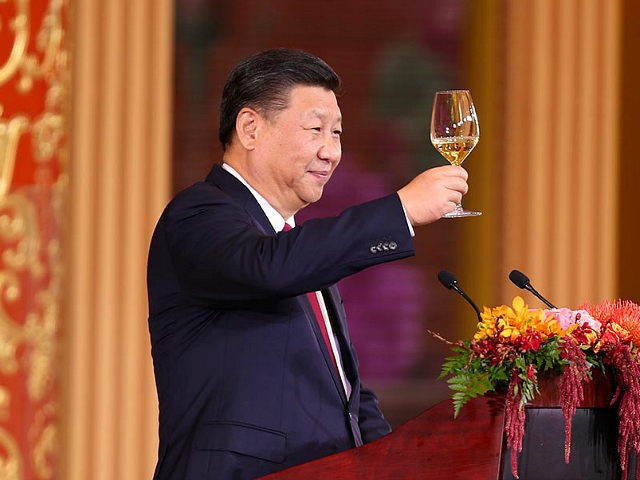An ethnic Kazakh held prisoner in one of China’s Uighur concentration camps confirmed to National Public Radio (NPR) Tuesday that the Communist Party forces those detained there to praise Chinese leader Xi Jinping before eating.
Kayrat Samarkand, who grew up in the mountains of China’s rural Xinjiang province just miles away from the border with Kazakhstan, told NPR that authorities at the camps, also known as “mind-transformation centers,” force prisoners to sing songs praising Chinese President Xi Jinping before being allowed to eat.
China claims the camps are “vocational training” facilities where Uighurs learn Mandarin and essential trade skills.
NPR explained:
A typical day at the camp would start at 6 a.m., he says, when detainees were ordered to sing along to songs played over the camp’s PA system, praising China’s Communist Party. After breakfast in a canteen, he says they were led to classrooms, where teachers taught detainees words in Pinyin, China’s Romanized writing system, alongside their Chinese-character equivalents.
They were also given books about Lei Feng, a Chinese soldier regarded as a model of selfless devotion to communism, and were periodically quizzed by teachers on their knowledge of the “126 lies” about religion. Instead of re-educating him, he says his experience at the camp “made me hate the government even more.”
The former prisoner also revealed Chinese authorities forced him to stand for hours while wearing “iron clothes” to break his spirit.
“They made me wear what they called ‘iron clothes,’ a suit made of metal that weighed over 50 pounds,” Samarkand told NPR. “It forced my arms and legs into an outstretched position. I couldn’t move at all, and my back was in terrible pain.”
“They made people wear this thing to break their spirits. After 12 hours, I became so soft, quiet and lawful,” he added.
Samarkand said he was finally allowed to leave the camp and return to Kazakhstan “after he attempted to kill himself by banging his head as hard as he could against a wall, which only managed to knock him out.”
According to U.S. government and independent assessments, Bejing has forced hundreds of thousands of ethnic Uighurs (or Uyghurs), Kazakhs, and other minorities into the camps, where Chinese authorities are committing human rights abuses.
Uighurs are facing “systemic torture,” disappearances, executions, and arbitrary detentions as part of Beijing’s “re-education campaign” ostensibly to combat alleged extremism and separatism, the U.S. State Department determined, noting that President Xi’s efforts against the Muslim minority “intensified” last year.
Beijing has defended its crackdown, claiming that the concentration camps are vocational centers focused on purging separatist and religious extremist elements from Uighur-majority Xinjiang.
On Tuesday, State Councillor Wang Yi, communist China’s top diplomat, dismissed Bejing’s human rights abuses at the re-education centers as “gossip,” urging the international community to ignore and trust authorities there, Channel News Asia reports.
Xinjiang, China’s largest province, borders various countries including Mongolia, Russia, Kazakhstan, Kyrgyzstan, Tajikistan, Afghanistan, Pakistan, and India.
Marking one of the first public criticisms from a predominantly Muslim country of Beijing’s policy in Xinjiang, China’s top ally Pakistan urged the Asian giant to take steps against the human rights abuses and repression of ethnic Muslim Uighurs in the province.
Referring to the internment camps, the Nation from Pakistan reported in September, “This includes programs that focus on psychological indoctrination. There have been reports of waterboarding and other forms of torture as well.”

COMMENTS
Please let us know if you're having issues with commenting.